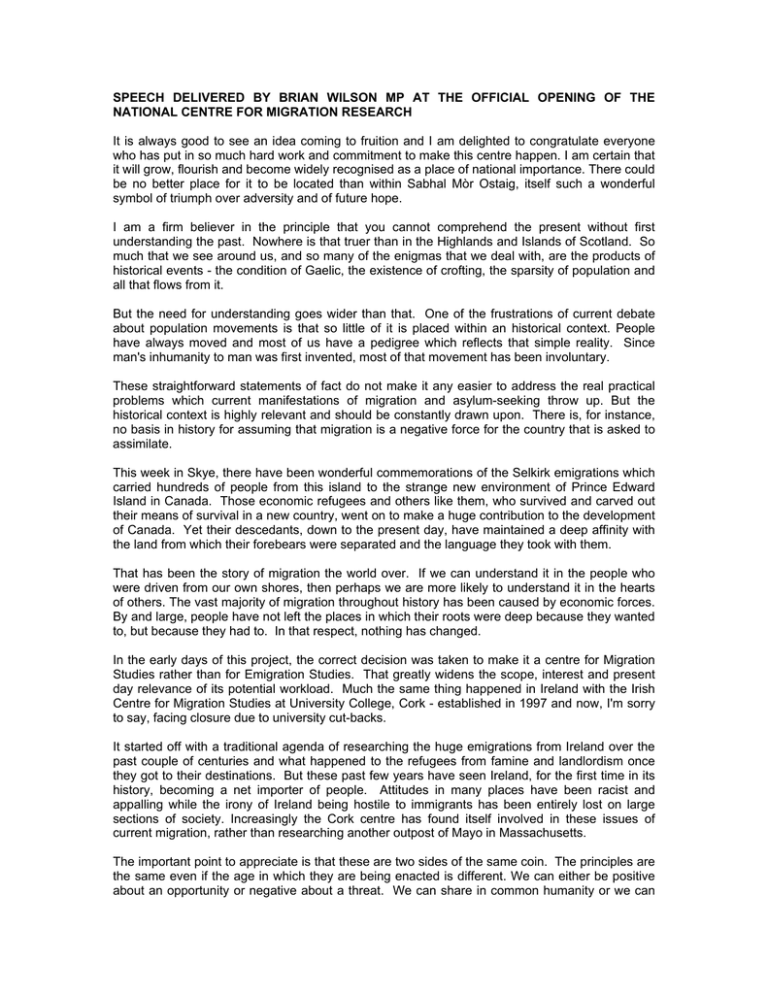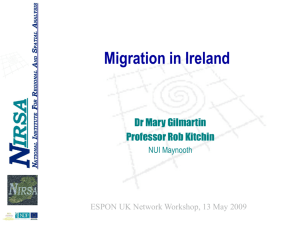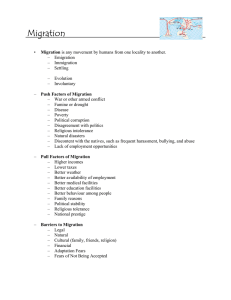It is always good to see an idea coming to fruition and I am delighted
advertisement

SPEECH DELIVERED BY BRIAN WILSON MP AT THE OFFICIAL OPENING OF THE NATIONAL CENTRE FOR MIGRATION RESEARCH It is always good to see an idea coming to fruition and I am delighted to congratulate everyone who has put in so much hard work and commitment to make this centre happen. I am certain that it will grow, flourish and become widely recognised as a place of national importance. There could be no better place for it to be located than within Sabhal Mòr Ostaig, itself such a wonderful symbol of triumph over adversity and of future hope. I am a firm believer in the principle that you cannot comprehend the present without first understanding the past. Nowhere is that truer than in the Highlands and Islands of Scotland. So much that we see around us, and so many of the enigmas that we deal with, are the products of historical events - the condition of Gaelic, the existence of crofting, the sparsity of population and all that flows from it. But the need for understanding goes wider than that. One of the frustrations of current debate about population movements is that so little of it is placed within an historical context. People have always moved and most of us have a pedigree which reflects that simple reality. Since man's inhumanity to man was first invented, most of that movement has been involuntary. These straightforward statements of fact do not make it any easier to address the real practical problems which current manifestations of migration and asylum-seeking throw up. But the historical context is highly relevant and should be constantly drawn upon. There is, for instance, no basis in history for assuming that migration is a negative force for the country that is asked to assimilate. This week in Skye, there have been wonderful commemorations of the Selkirk emigrations which carried hundreds of people from this island to the strange new environment of Prince Edward Island in Canada. Those economic refugees and others like them, who survived and carved out their means of survival in a new country, went on to make a huge contribution to the development of Canada. Yet their descedants, down to the present day, have maintained a deep affinity with the land from which their forebears were separated and the language they took with them. That has been the story of migration the world over. If we can understand it in the people who were driven from our own shores, then perhaps we are more likely to understand it in the hearts of others. The vast majority of migration throughout history has been caused by economic forces. By and large, people have not left the places in which their roots were deep because they wanted to, but because they had to. In that respect, nothing has changed. In the early days of this project, the correct decision was taken to make it a centre for Migration Studies rather than for Emigration Studies. That greatly widens the scope, interest and present day relevance of its potential workload. Much the same thing happened in Ireland with the Irish Centre for Migration Studies at University College, Cork - established in 1997 and now, I'm sorry to say, facing closure due to university cut-backs. It started off with a traditional agenda of researching the huge emigrations from Ireland over the past couple of centuries and what happened to the refugees from famine and landlordism once they got to their destinations. But these past few years have seen Ireland, for the first time in its history, becoming a net importer of people. Attitudes in many places have been racist and appalling while the irony of Ireland being hostile to immigrants has been entirely lost on large sections of society. Increasingly the Cork centre has found itself involved in these issues of current migration, rather than researching another outpost of Mayo in Massachusetts. The important point to appreciate is that these are two sides of the same coin. The principles are the same even if the age in which they are being enacted is different. We can either be positive about an opportunity or negative about a threat. We can share in common humanity or we can turn our faces against it. We can learn from the past in order to understand the present and temper its injustices.

